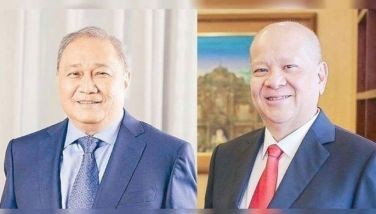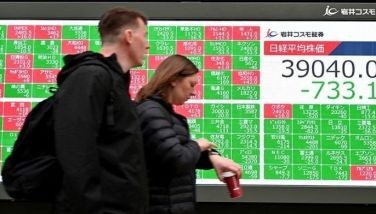And the plot thickens
The recent “expose” by Senator Panfilo Lacson involving the alleged coercion used by former President Estrada to force businessman Alfonso Yuchengco into selling his shares in the Philippine Telecommunications Investment Corp. (PTIC) that allowed First Pacific to acquire a controlling stake in the Philippine Long Distance Telephone Co. (PLDT) raises more questions than answers.
First, if there was bad blood between the Yuchengcos and the First Pacific Group, why is it that Yuchengco’s daughter Helen Dee has been sitting in the PLDT board for the last 11 years.
And why would PLDT give so much business to the Yuchengco companies? Malayan Insurance Company insures two-thirds of the non-life insurance requirements of PLDT while RCBC remains one of the major banks of the country’s largest telecommunications companies. Malayan Insurance also handles the property insurance requirements of Smart Communications and the other PLDT subsidiaries while RCBC is also a major banker of the PLDT-owned companies.
Following Lacson’s privilege speech, Yuchengco’s lawyers issued a statement in which the businessman admitted that he was indeed coerced to sell his PTIC shares. But he did not mention the name of the former President as the one who forced him to sell. Yuchengco claims that some armed policemen came to his house at a very unholy hour together with Ambassador Alberto del Rosario and harrassed them with the objective of forcing them to sell their PTIC shares.
This is not the first time that Yuchengco claims lack of free will in giving up his shares in PTIC. In a number of cases filed against the Sandiganbayan and against the state of former President Marcos, Yuchengco sought to recover from the Cojuangcos their shares of stocks in PTIC, claiming that the Marcos regime compelled him into giving up six percent of PTIC shares and deprived him of exercising his option to buy General Telephone and Electronics, Inc.’s (GTE’s) 25-percent equity in PTIC. This 25-percent equity in PTIC was subsequently acquired by Prime Holdings Inc. (PHI), a company owned by the Cojuangcos. According to Yuchengco, Marcos coerced him to give up his shares in the company and instructed him to cooperate with Ramon Cojuangco.
PHI’s shares in PTIC were later declared by the Supreme Court to have been ill-gotten. But the High Tribunal ruled that this belonged to government, even as the former rejected Yuchengco’s claim over a portion of the shares.
While in the latter case, Yuchengco explicitly indicted Marcos as having coerced him to give up the right to acquire additional shares in PTIC. In the case of the sale to First Pacific, the businessman did not specifically mention the name of Estrada.
It was on Nov. 24, 1998 when First Pacific announced its acquisition of a 17.3-percent stake in PLDT for P29.7 billion ($749 million), representing a 27.2 percent voting interest in the company. The acquisition was made via a two-step process – first, by buying a 5.9 percent stake in PLDT on the open market, and second, by acquiring an indirect 11.3 percent stake by purchasing 52.7 percent of PTIC from the family of Antonio ‘Tonyboy’ Cojuangco, Nori Ongsiako and family, Antonio Meer, and Al Yuchengco. In 1998, PTIC controlled 21.5 percent of PLDT’s voting stock. First Pacific paid about P1,420 per share, a 31 percent premium on the then market rate of P1,085.
Lacson’s expose is not new. During the impeachment hearings against Estrada in 2001, former SEC chairman Perfecto Yasay claimed the former president received P1 billion in kickback to facilitate the transaction which PLDT chairman Manuel Pangilinan disputed in an affidavit that he executed at that time. Estrada later stepped down from office, was found guilty of graft and corruption, was pardoned by President Arroyo, and the rest is history.
Among the questions being raised about the whole issue is the credibility and timing of Lacson’s expose. If indeed, Yuchengco was coerced to sell his shares to the First Pacific group, why didn’t he file a case to rescind the sale on the ground of lack of consent? Why didn’t Lacson speak out when the whole thing was taking place?
Some quarters are questioning whether or not it was really Alfredo Yuchengco who is doing all the accusations. They are saying that Yuchengco’s 18,720 PTIC shares involving about two million direct PLDT shares are now worth P4.7 billion and to claim the shares back would ensure a huge windfall and that some parties, not necessarily the patriarch, may be behind all these.
If indeed, the Yuchengco’s were unduly deprived of their shares, then they should bring the case to court and let justice take its course.
Tax on the poor
We can only surmise as to the real intent of the proponents of a bill that seeks to impose a five centavo tax on test messaging as well as overseas calls.
If the purpose is to raise additional funds for government, then killing the goose that lays the golden eggs is not the answer.
With text messages retailing at only 10 to 30 centavos because of free and unlimited text promotions, the effective tax rate is not five percent of P1 as the proponents claim, but 50 percent of 10 centavos, almost five times the amount of VAT and much higher than the present corporate income tax rate, as pointed out by Bacolod Rep. Monico Puentevella.
And because the telecommunications companies have to absorb the additional cost, they have no choice but to either pass on the cost to the subscribers, thereby raising the price of text messaging, or to stop offering free and unlimited text promos.
Either way, the country will be at the losing end. Poor Filipinos who have never before enjoyed cheap means of communications will have to pay for more.
In a privilege speech, Puentevella noted that in these times of great economic difficulty, when every centavo makes a difference, it is cruel and unconscionable to put forth any proposal that seeks to bilk any more money from the Filipino consumer.
Right now, the telcos are giving so much to the country in terms of state-of-the art communications infrastructure and services, billions of pesos in taxes, various CSR-related projects, to name a few. And they are able to do so because they are making money. What is wrong with that? They are businesses that have the right to earn an honest living. And they are giving so much in return.
Imposing a five centavo tax on a 10 centavo text message will not give them reasonable return in their investments. And why is that? These legislators simply do not realize or refuse to realize that you still have to deduct from the 10 centavos the cost of the service. Making telcos pay five centavos per text is like asking them to stop doing business because it doesn’t make any sense. After all, free and unlimited text promos now account for a bulk of text messages sent.
The President herself asked the telcos to bring down their text messaging rates. And now, here is a proposal that in effect is forcing telcos to raise their rates. Shouldn’t the President take this as an affront against her?
For comments, e-mail at [email protected]
- Latest
- Trending























